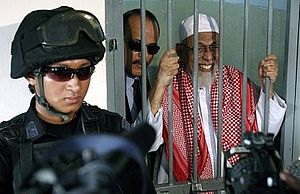Officials from Indonesia and Malaysia, Southeast Asia’s two Muslim-majority states, have expressed concern that the threat from the Islamic State (IS) movement in Syria and Iraq could be growing in their countries in spite of initial measures taken to counter the movement’s appeal.
In Indonesia, the world’s largest Muslim-majority country, the nation’s counterterrorism chief Saud Usman Nasution warned last week that recruitment of IS fighters from Indonesia had more than tripled in just a few months. All in all, Saud said around 514 Indonesians have gone to Iraq and Syria to fight with the movement, with about half being students or migrant workers who had already been living in neighboring countries. That makes Indonesia Southeast Asia’s biggest supplier of IS fighters by far, raising questions about what might happen once those militants return home.
On Sunday, the National Counterterrorism Agency launched Indonesia’s first ever public blueprint for tackling terrorism, with officials stressing counter-radicalization and de-radicalization programs in addition to traditional law enforcement measures. But while the government has banned IS, Indonesian laws currently do not allow authorities to charge or detain IS supporters who leave to fight for the movement. That is a significant limitation for Indonesian authorities relative to their counterparts in Malaysia.
“We don’t want Indonesia to have an Internal Security Act, but it would be good to make participation in military training by extremist groups at home and abroad illegal,” Sidney Jones, the director of the Institute for Policy Analysis of Conflict, told The Jakarta Post in an interview.
In neighboring Malaysia, despite a wave of arrests, a police source said last week that the number of Malaysians fighting for the militant movement had risen from 39 to 50 since the end of October. Beyond numbers, Home Minister Ahmad Zahid Hamidi had warned on November 25 that the overall terror threat in Malaysia had reached “a whole new level,” with growing links between foreign and local fighters and militants seeking to influence domestic political parties and raise funds in Malaysia. Some of those arrested recently were reportedly planning attacks on government agencies, night clubs and pubs, including a brewery owned by Danish beer company Carlsberg according to Channel News Asia.
The country is also increasingly being used as a transit point for individuals from neighboring states looking to then find their way to the Middle East. On Monday, Inspector-General of Police Khalid Abu Bakar confirmed that seven suspects were detained in raids conducted on December 2. He also said one of the suspects was a facilitator in charge of arranging the departure of Indonesian militants into Syria, and is believed to have links with Umar Patek, the mastermind behind the deadly Bali bombings in 2002 and a key member of al-Qaeda’s Southeast Asian affiliate Jemaah Islamiyah who was imprisoned in 2012.
To respond to this growing threat, the Malaysian government is working on strengthening existing laws to curb terrorism. Malaysia passed a White Paper – just the third in the nation’s history – on the issue late last month, and a draft of a new Anti-Terrorism Act is expected to be tabled at parliament’s next session in March 2015. Khalid, the Inspector-General, said that it would be a timely move as current laws were inadequate.
“There is a need for a special law to tackle terrorism in the country and this law will also give the police power to tackle such threats,” he said.
He also said on Monday that the Sydney hostage crisis should serve as a reminder that such incidents could happen anywhere, including in Malaysia.
“This can become a lesson for us and we will have to be prepared for any threats or actions like what happened in Sydney,” Khalid said.

































